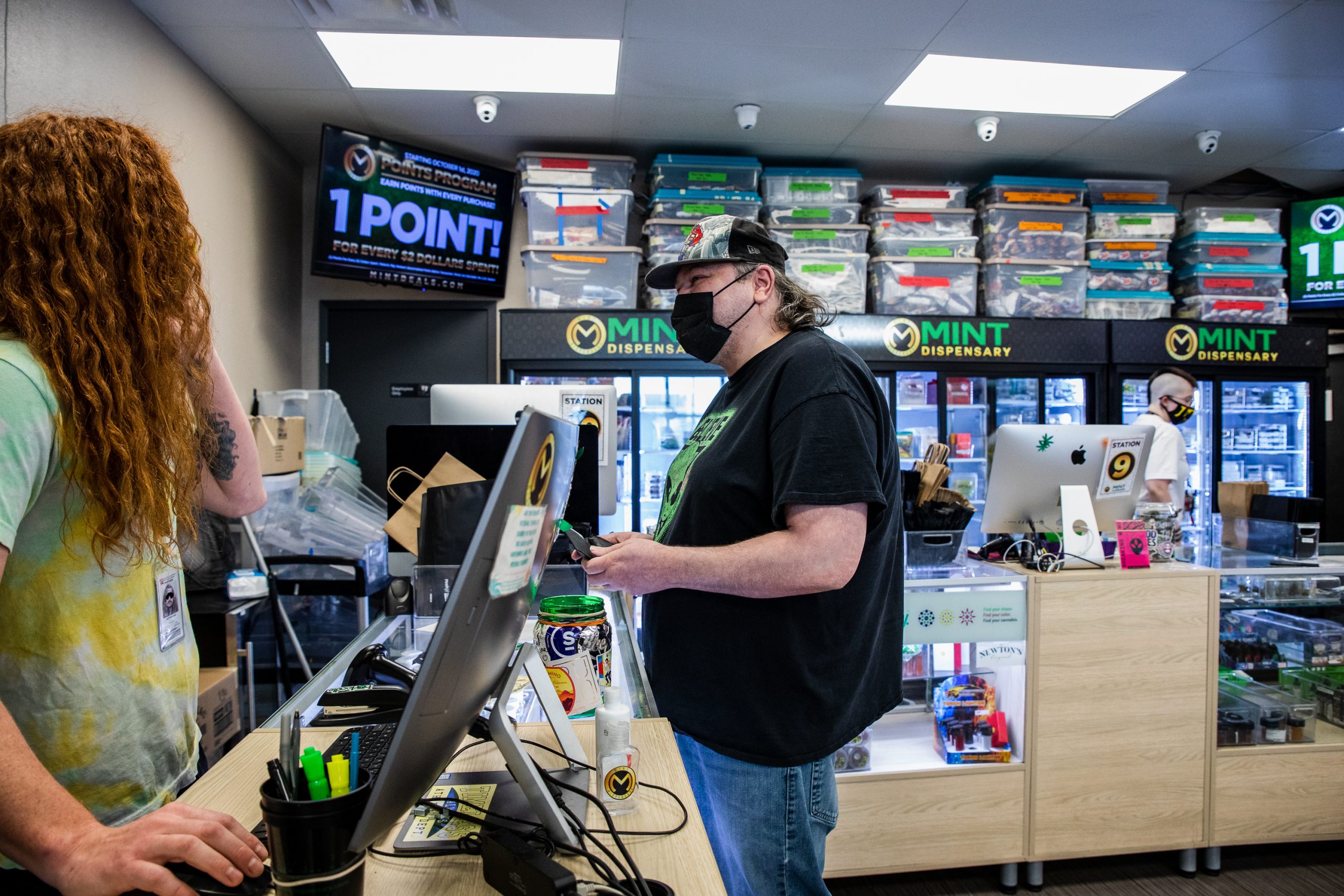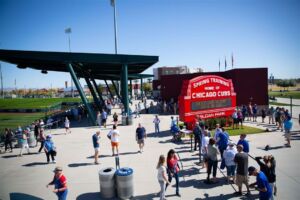On a recent weekday morning, Paul Petersen of Florence was one of the first to arrive at Mint Dispensary to get something not usually offered at the cannabis shop: a free COVID-19 vaccine.
The 40-year-old had been holding off on getting vaccinated to see how others responded but was persuaded by an added perk: Mint’s Snax for Vaxx event. Mint gave away one free edible and a pre-rolled joint to anyone 21 or older receiving a Moderna vaccine.
Petersen said he took advantage of the opportunity to acquire “two things at once.”
“I’m comfortable with it now,” he said of the vaccination process, “but I didn’t trust the science before.”
READ ALSO: Answers to your burning COVID-19 vaccine questions
With COVID-19 vaccination rates declining in Arizona and other states, public and private entities are using incentives to reverse the trend and get more shots into more arms.
From free doughnuts at Krispy Kreme shops to cold, hard cash from the state of California, individuals stepping up to get pricked can be rewarded in myriad ways.
In Arizona, Mint joined with Commerce Medical Group to provide vaccinations at pop-up clinics June 1 through 3 at its locations in Mesa, Tempe and Phoenix. Forty doses were brought to each location, and about two-thirds were distributed, said Kristy Jozwiak, a spokesperson for Mint.
Linzy Volm, a medical assistant for Commerce Medical Group who helped at the Mesa location, said more people turned up than she’d expected.
“I think it helps, giving a reward for (the shots),” she said. “But it kind of sucks that it has to come down to people being bribed to get vaccinated.”
President Joe Biden has a goal of getting 70% of U.S. adults at least one vaccine dose by July 4. As of Wednesday, 65% of adults had at least one shot, while about 55% of adults were fully vaccinated, according to the Centers for Disease Control and Prevention.
In Arizona, about 59% of adults have at least one dose, while 48% of adults have been fully vaccinated, according to the CDC.
As of Wednesday, just one state – Vermont – had succeeded in fully vaccinating more than 70% of adults.
Vaccine administration in the U.S. has dropped off since April, when the nation hit a high of 4,348,818 new doses administered on April 8. Arizona has also seen a decrease – falling from a high of 77,176 doses on March 31 to fewer than 30,000 every day so far in June.
“Unfortunately vaccines, like masks, have been politicized,” said Dr. Shad Marvasti, director of public health, prevention and health promotion at the University of Arizona College of Medicine in Phoenix. “People have been fed a great deal of misinformation, which has really confused the general public about the science and the safety involved.
“In lieu of being able to stop misinformation, we’re having to create incentives for people to participate in vaccination.”
Anheuser-Busch, maker of Budweiser beer, is partnering with the Biden administration to offer virtual credits for a free beer to anyone 21 or older if the July 4 target is met. It’s just one of several efforts at the local, state and national level to increase vaccination rates.
This month, many vaccination sites are offering extended hours, and some pharmacies will be open 24 hours on Fridays.
Child care organizations KinderCare, Learning Care Group and Bright Horizons will watch children for free while parents get vaccinated, and Uber and Lyft are offering complimentary rides to and from shot sites.
In Arizona, Pima County is offering $2 scratch-off lottery tickets to vaccine recipients.
Dr. Cara Christ, director of the Arizona Department of Health Services, said in an interview with Arizona PBS that the state is considering various incentives, too, although she didn’t elaborate.
“We’re going to continue to explore different incentive options, and we’ve been reviewing what other states have been providing as well,” she said.
Christ added that Arizona remains committed to increasing vaccinations among people of color – especially Latinos, who comprise 30% of COVID cases and 28% of deaths in the state but only 15% of the vaccinated population.
Nationally, organizations such as the Mayo Clinic and the American Hospital Association have pushed to increase vaccination rates in communities of color.
Marvasti said the state should hold health fairs and partner with more entities, including churches, food assistance programs and social service agencies, to provide better vaccine education and access to those hit especially hard by the coronavirus that causes COVID-19.
“Communities of color have been disproportionately impacted because systemic, structural racism has been present and already devastating communities,” he said. “COVID has just unveiled that and exposed them further.
“We still haven’t done enough to address their needs, so we really need to take a hard look in the mirror and make a change.”
Marvasti said incentives are working to an extent, but to reach herd immunity, vaccine mandates may be necessary.
Federal equal employment opportunity laws do not prevent employers from requiring in-person staff to be vaccinated, and some private employers have taken that step, resulting in a smattering of court challenges.
And although many universities and colleges are requiring students to be vaccinated to return to campus in the fall, Gov. Doug Ducey issued an executive order this week saying students at Arizona’s public universities and colleges cannot be required to get vaccinated or submit proof of vaccination.
Will Humble, executive director of the Arizona Public Health Association, said he and a cohort of students conducted a study this spring to determine what factors would prompt Arizonans 18 to 24 to get shots. Their results showed the immunizations needed to be free and conveniently located with no appointments required.
According to a poll released by the African American Research Collaborative and The Commonwealth Fund, some 53% of unvaccinated respondents would prefer to receive a COVID shot from a doctor’s office. And 60% of the 13,000 participants said they consider their primary care physician the most effective messenger for vaccine information.
“Our target needs to be more and more convenient for that, rather than more and more incentive – like someone who isn’t even planning to get vaccinated has it presented right in front of their face … a split-second decision on the table,” Humble said. “We need more spontaneity in the system.”
Mint Dispensary plans to hold the second round of Snax for Vaxx from 1 to 4 p.m. June 29, 30 and July 1 at its Mesa, Tempe and Phoenix locations.
Pablo Palomino, executive branding officer of Mint, said the events are a good way to help the community while offering more awareness and education about the company’s products.
“We’re just trying to provide opportunities to the community,” he said. “Whoever wants to take advantage of them, they’re here.”
Nathan Branham, a parks worker from Avondale, brought his friend to the Mint vaccination event in Mesa for his first shot. Branham is fully vaccinated but said he would’ve cashed in on Snax for Vaxx had it happened earlier.
“It gives someone added incentive,” he said. “People are already scared, so it’s going to help them – because weed is a great way to relax.”
Story by Mikenzie Hammel, Cronkite News




